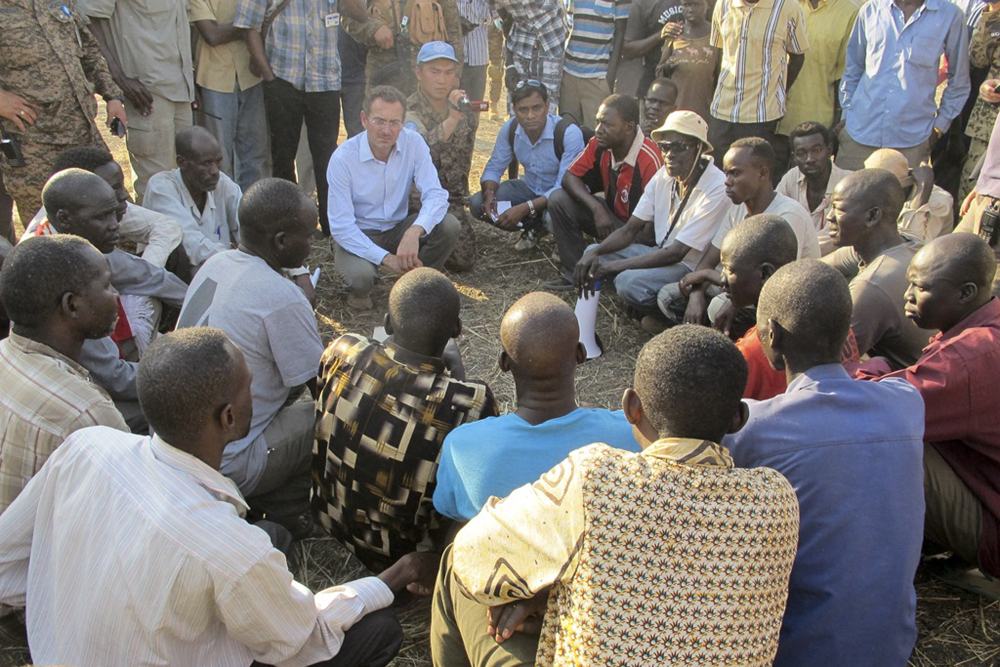JOHANNESBURG — African leaders met South Sudanese President Salva Kiir on Thursday as part of an intense international diplomacy effort to halt the country’s slide into civil war, as fighting continued in the north of the country.
Fighting raged outside Bor, in Jonglei state, recently retaken from rebel forces by the government, and in oil rich Upper Nile state.
Thousands are feared dead in 12 days of violence, but many victims are in remote areas, making firm estimates impossible.
Kenyan President Uhuru Kenyatta and Ethiopian Prime Minister Hailemariam Desalegn flew into Juba, the South Sudan capital, Thursday. Desalegn said the two leaders held candid, constructive talks with Kiir, but there was no sign of any breakthrough. Further talks are scheduled in the Kenyan capital, Nairobi, on Friday.
A stumbling block is Kiir’s demand that his rival, former Vice President Riek Machar – whom he dismissed in July – come to the negotiating table without any conditions. Machar, meanwhile, is demanding the release of 11 arrested former ministers who are part of the opposition.
In addition, there’s Kiir’s accusation that Machar and the arrested opposition figures launched a coup, a claim Machar denies. South Sudan government officials said Wednesday that the coup investigation must go forward. On Thursday, Machar appointed his delegation to any peace talks that may take place, which included former ministers now in jail, the Sudan Tribune reported.
Despite reports by the United Nations and local media of killings based on ethnicity, Kenyatta said it was wrong to suggest that there was an ethnic element to the crisis.
“The media, non-government organizations and other organizations have created a perception that the political dispute in South Sudan was ethnic fighting. We should strive to correct that negative impression,” Kenyatta said, according to Kenyan media.
Ethiopian Foreign Minister Tedro Adhanom told reporters that good progress had been made in the talks.“The issues we discussed were, among others, the cessation of hostilities; and the second is the immediate start of talks or dialogue to settle the issue politically; and the third issue is on the detainees who are … (suspected of plotting) the coup,” he said. A South Sudan government official said Machar would have to renounce the rebellion, news agencies reported.
Kiir sacked his entire Cabinet in July. Many of the dismissed officials became openly critical of him, leading to deep divisions in his ruling Sudan People’s Liberation Movement. Machar later indicated that he would run against Kiir in elections in 2015.
Attempts to resolve the differences at a party conference earlier this month failed, and days later fighting broke out among rival factions of the presidential guard.
The U.N. Security Council voted Tuesday to boost its force in South Sudan by 6,000 troops to 12,500 soldiers, in a bid to protect civilians.
Send questions/comments to the editors.



Success. Please wait for the page to reload. If the page does not reload within 5 seconds, please refresh the page.
Enter your email and password to access comments.
Hi, to comment on stories you must . This profile is in addition to your subscription and website login.
Already have a commenting profile? .
Invalid username/password.
Please check your email to confirm and complete your registration.
Only subscribers are eligible to post comments. Please subscribe or login first for digital access. Here’s why.
Use the form below to reset your password. When you've submitted your account email, we will send an email with a reset code.